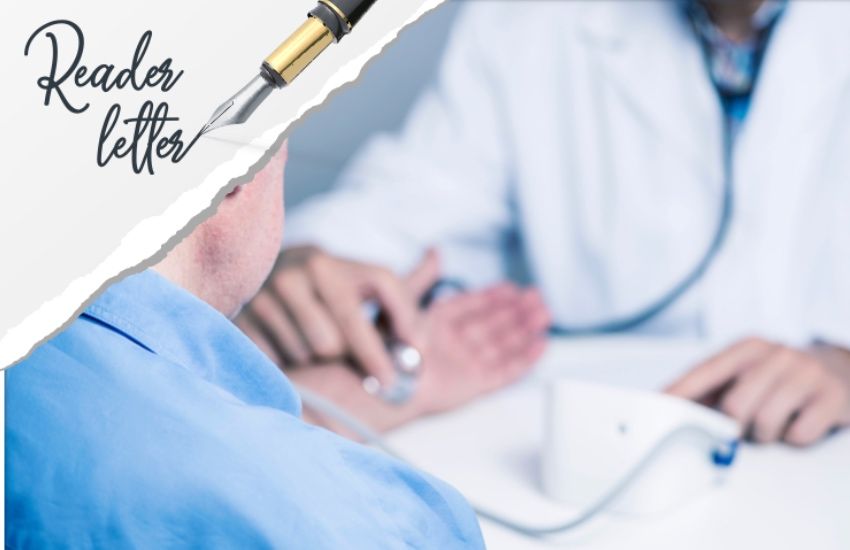


In response to several requests for information about the funding of treatment and drugs for private patients, the Committee for Health & Social Care has published an extensive document on the topic.
You can read it in full below:
"The Committee for Health & Social Care has received multiple requests for information regarding the funding of treatments/drugs for private patients. These requests have come either directly from Mr Read of HEAL, or via the media following information provided to them by Mr Read and/or HEAL.
"Mr Read on behalf of HEAL has also published an open letter via the Bailiwick Express challenging HSC over its charging policies. While this letter makes reference to an individual patient, HSC has a responsibility to maintain the confidentiality of its service users and will not be providing any details relating to this case."

"Whilst HSC is responsible for the delivery of health and care services, with regard to NICE TAs it does so in accordance with a policy approach approved by the States of Guernsey – publicly and transparently debated - with accessible Hansard records and documented resolutions.
"Due to the number of separate approaches for similar information on the same core issue, HSC will be providing one response to enable valuable staff resources to more effectively work on areas that have been agreed as a priority via the Government Work Plan.
"Mr Read and/or HEAL has already been provided with all of the information detailed below in previous correspondence and it is reproduced again to set out the position of HSC at this time and respond in full to the (collective) questions that have been received."
"The Committee is responsible for providing health and social care services within its allocated annual budget and has to make difficult decisions on funding between competing needs across the wide spectrum of services within its mandate. The Committee therefore adopts prioritisation as its primary method for decision making in relation to the allocation of resources from its annual budget, in turn based on expert clinical advice and guidance."

"Outside of States funded core services, all patients have the option to access private treatment, either on-Island (when available) or by accessing off-Island providers. Some may have insurance to pay for this choice, and some will not. Individuals will always have the option to exercise a level of choice in health care and elsewhere and HSC continues to respect that patient choice. Medical professionals will advise patients of options and these discussions will clearly set out the ongoing cost implications for their patient in advance."
"When the States considered the Committee’s Policy Letter entitled ‘Review of the Funding of Drugs, Treatments and Devices’ in January 2020, it resolved, in principle, a policy of funding drugs and treatments in receipt of a NICE TA, including drugs approved for funding from the Cancer Drug Fund. It further resolved that a phased approach to implementation be adopted, starting with drugs and treatments with an ICER value of up to £30,000 in the first year of implementation, followed by an increase to an ICER value of up to £40,000 in the second year. In line with this decision, steps are currently being taken to introduce drugs with an ICER value of up to £40,000 and this has been progressing well.
"On a practical basis, enabling Islanders to have access to new NICE TAs has been implemented on a phased basis as it takes time to procure new drugs and treatments and to put in place the necessary protocols to enable their use. It is incorrect to suggest that patients are not being fully advised of the treatments available to them, as HSC has established relationships with primary and secondary care professionals and all information about the recommendations made by the Prescribing and Formulary Panel, which oversees the process for amending the ‘White List’ (see below) on behalf of the Committee for Health & Social Care, are published on www.gov.gg.
"The funding of these drugs is not currently met through the HSC Committee’s annual budget, but rather through the Guernsey Health Reserve. Before any recommendation can be made to introduce drugs and treatments with an ICER value greater than £40,000 the Committee is required, with the Policy & Resources Committee, to return to the States with a review of the first two years of implementation and details of long-term funding arrangements for the introduction of drugs and treatments with an ICER value greater than £40,000. HSC is committed to supporting and delivering this review."

"While the NICE TA policy has been set out in various iterations of the Government Work Plan, the policy direction from the States, set out above, has not changed and this means that while the range of drugs publicly funded has increased during 2021 and 2022, some are only available to patients on a private basis. The earlier work that was completed in 2018/2019 and presented to the States indicated that to make all NICE TAs available could cost in the region of £13.1m, addressing both the potential ‘backlog’ of patients and taking account of those new patients becoming eligible each year, with an ongoing annual cost estimated to be in the region of £5.5m. It will therefore be for the States to determine, in 2023, if it wishes to fund a wider range of drugs into the future, considering wider revenue pressures.
"While it is true that medicines in receipt of a NICE TA are currently more widely available in England and Jersey, the Committee is working to the direction of the States, and within the constraints of its resources, to make such medications available to islanders. If during the course of this work other potential areas of improvement are identified then the Committee will endeavour to resolve those matters in line with the principles that it is guided by during any review, as set out in the Partnership of Purpose."
"The funding of medicines and medical appliances in the Bailiwick can be difficult to navigate with a number of different routes to access depending on the nature of the drugs or appliances required. However, information is made available online and all Bailiwick clinicians are aware of the routes to access funding through well-established practices and patients will be advised by their clinicians accordingly. HSC does not seek to be opaque in its decision making, but respectfully must point out the complexity of the decisions it is mandated to make.
"HSC provides information on its website and in paper format if necessary on funding prioritisation (Funding Prioritisation - States of Guernsey (gov.gg)) - and medicines funded by the States of Guernsey (Medicines funded by the States of Guernsey - States of Guernsey (gov.gg))
"Policy guidelines and application form etc are all available on these pages."
"The States of Guernsey maintains a ‘white list’ of drugs and medical appliances which are available to residents of Guernsey, Alderney Herm and Jethou following payment of the prescription charge (unless the resident is exempt from prescription charges)."

"The Prescribing and Formulary Panel meet on a monthly basis to discuss what medicines and appliances are added or removed from the white list. The minutes of these meetings from June 2019 are available online here - Medicines funded by the States of Guernsey - States of Guernsey (gov.gg)
"The Bailiwick of Guernsey is not part of the National Health Service in the United Kingdom. Consequently, not all drugs with positive NICE Technology Appraisals are available at public expense. Sometimes a medical professional will advise that the most appropriate treatment is a medicine or appliance that is not on the White List. In these unusual cases, a private prescription can be issued or an individual funding request can be made and considered (further information below)."
"In line with established practice in other jurisdictions, HSC has an established operating position whereby an uplift is applied to the cost of drugs provided to private patients, in addition to the cost of the drug and a pharmacy dispensing fee, whether the cost of that private care is self-funded or met through an insurance policy. It is standard practice in healthcare across the UK and in Jersey to charge an uplift on baseline costs for private services for a range of reasons and the uplift charged by HSC is equivalent to Jersey at 25%. Other private providers in the UK are understood to charge more than this.
"Discussions at a Committee/Board level regarding an uplift for private patients dates back to 2010. The decision to introduce the uplift was approved and is a recorded decision of the, then, Health and Social Services Department. It has operated this policy every year since this date and while it has not been set out in an operational policy document, it has been consistently applied.
"The uplift goes some way to compensate for the handling and overhead costs including the time and complexity involved in sourcing, ordering, receiving, storing and checking the stock as necessary and reflects the investment by Health and Social Care in the stock of the drug, the risk of it going out of date or the patient stopping treatment. It does not cover the full cost of providing private treatment/services – as the costs of staff and necessary systems are not fully included in any calculation as these are in place regardless of the type of treatment being provided. While the cost of these overheads would be very resource intensive to calculate for each individual or round of treatment, applying an uplift does seek to recover the wider direct and indirect costs incurred by HSC for the offering a private service and is again in the context of the wider States’ decisions not to routinely fund these higher value ICER drugs at this time.
"It would be inaccurate to describe such costs as profiteering. The 25% uplift is not intended to generate a surplus but to recover a proportion of operating expenses as described, as per other charges raised by the States of Guernsey for some of its services.
"Anyone wishing to access private drugs or treatment is provided with full details of the costs involved, along with details on efficacy etc. which are unique to each drug/treatment required. The uplift policy is not specifically set out in an operational policy document and Officers have therefore been requested by the Committee to review the requirement to set out the private pricing policy in this way. There is no extant Resolution of the States, nor an Ordinance, that relates to the uplift."
"Every year, HSC receives money to pay for health and social care. Information on funding prioritisation can be found here Funding Prioritisation - States of Guernsey (gov.gg)
"As a result, there are some treatments and services that HSC does not normally make available or are only funded when certain conditions are met. A GP or specialist can make an individual funding request."

"Whilst called an Individual Funding Request (IFR), all applications are made by a health professional. The application form can be found here - Funding Prioritisation - States of Guernsey (gov.gg) and it requests clinical information and evidence of sufficient detail to enable the IFR panel to make a proper assessment. The form asks the requester to ‘Please provide a summary of the evidence base relevant to this application to demonstrate clinical effectiveness, good use of public resources and the safety of the treatment.’
"Policy document G1002 (available online) provides full details of the process and requirements for IFRs.
"The Committee, and its staff, has to make difficult situations regarding funding on a regular basis as it is mandated to provide a wide range of health and social care services, not solely medicines, for the Bailiwick within a fixed budget.
"The Committee’s intention to transform its services are set out in the Partnership of Purpose.
"One of its key aims is to ensure fair access to care by removing financial barriers that prevent islanders from accessing the help that they need. This applies to all service areas provided by HSC and its partners and, of course, has to be done within the fixed budget allocated to the Committee.
"Nonetheless, HSC’s Officers have been working hard to implement the decision of the States of Deliberation to fund NICE TA’s with an ICER value of up to £40,000. The Committee will be looking to better understand the effects on HSC’s revenue position if the uplift for private patients were to be removed but this is not a commitment to do so. This will take place as soon as is practicable whilst balancing this matter against other pressing issues and HSC’s priorities as identified in the Government Work Plan. Any change in this area is likely to impact on the ability to offer other services without additional revenue being provided to compensate."
"If an individual or clinician believes that exceptional circumstances should be considered in any treatment or funding request, they can provide that information. Policy document G1002 states what is meant by exceptional circumstances. CHttpHandler.ashx (gov.gg)
"The Committee recognises the sensitivities and challenges surrounding extremely difficult and emotive matters such as this and will be prioritising the limited specialist pharmacy resource to further evaluate the long-term approach to drug funding in order to report on the next stages of work in respect of NICE TAs in the first half of 2023, as set out in the Government Work Plan.
"The forthcoming budget debate will also bring into sharper focus the challenges of meeting the health and care needs of the population, as will the Tax Review, and the difficult decisions that need to be made about how best to prioritise where public money is spent to maximise the benefit for our community."